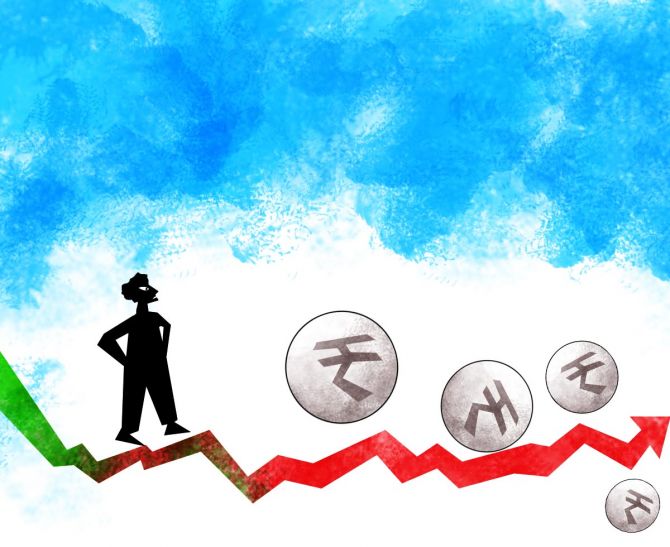'The long-term impact of elections is minimal.'

"India's robust fundamentals, reasonable valuations, and strong domestic investment flows provide a buffer, potentially keeping Indian equities more resilient than those of its peers," Anand Rathi, founder and chairman, Anand Rathi Group, tells Puneet Wadhwa/Business Standard in an e-mail interview.
Can global risks unsettle the Indian equity market rally?
Global risks loom large, from persistent inflation and a robust job market in the US, limiting monetary easing prospects, to recessions in Germany and the UK, with the US potentially following suit by late 2024 or early 2025.
Commodity prices are firming, and geopolitical tensions in Europe and the Middle East are volatile.
Concerns over stretched valuations in global equities also persist.
These factors could influence Indian markets, primarily through changes in cross-border equity flows.
However, India's robust fundamentals, reasonable valuations, and strong domestic investment flows provide a buffer, potentially keeping Indian equities more resilient than those of its peers.
What about the events back home, especially the election outcome?
Domestically, while elections could sway markets temporarily, their long-term impact is minimal, especially with opinion polls currently predicting a stable outcome in 2024.
Inflation risks exist, but with moderating inflation, significant rate cuts by the RBI appear unlikely, as are hikes, unless inflation substantially exceeds expectations.
The severe summer could affect agricultural output and increase perishables' spoilage, potentially fueling food inflation.
However, these factors are not expected to severely impact the broader stock markets.

IMAGE: Anand Rathi.
Photograph: Kind courtesy Anand Rathi group
Would large-caps outperform the mid-and small-cap stocks in fiscal 2024-25 (FY25)?
Our analysis favors small-caps, followed by large caps, and then midcaps.
The rationale is two-fold: Anticipated earnings growth for small-caps is projected to surpass that of large-caps over the next two years.
Also, our valuation models suggest small-caps are currently undervalued, whereas large-caps are fairly priced and midcaps appear overvalued.
Does a strong economy necessarily mean a buoyant equity market?
Empirical evidence from numerous cross-country studies underscores a robust correlation between macroeconomic performance and equity returns over the long-term.
This relationship holds particularly true in India, where we observe a strong correlation between nominal GDP growth and Nifty 50 earnings over the past two decades.
Hence, a strong Indian economy generally translates into a buoyant equity market.
With more and more investors jumping onto the equity bandwagon, is it 'Acche Din' for broking houses? How does Anand Rathi plan to stand out amongst competition?
Increased trading volumes, from both institutional and retail investors, benefit the brokerage sector.
However, while revenues are rising, so are costs, driven by regulatory changes, increased competition, and rising operational expenses.
Anand Rathi is investing heavily in technology and enhancing research offerings to improve recommendation quality and execution capabilities, ensuring that we maintain a competitive edge. Therefore, both -- our revenues and costs -- are rising fast.
Should Indian investors increase their allocation in gold and other asset classes if returns from equities are likely to remain muted in the next 12 to 18 months?
Over a three-year horizon, Indian equities typically outperform gold both in returns and risk-adjusted measures.
The fundamentals for forecasting gold prices are less robust compared to equities and debt.
Given the limited market size of gold relative to equities, significant allocations to gold are impractical and unlikely to materially affect portfolio returns.
Furthermore, Indian households already hold gold allocations nearly five times that of global averages, making further significant investment in gold inadvisable under current conditions.
Typically, what are the net margins that broking and wealth management firms enjoy, and do you think this will come down as the industry becomes more competitive?
Broking margins vary by segment and cycle, ranging from high double digits in good years to single digits in challenging ones.
Our wealth management business maintains more stable margins, currently just over 30 per cent at the net level and around 38 per cent in terms of return on equity.
Despite rising competition, maintaining strong focus on clients' interests and differentiated services offerings for targeted client segments should safeguard our margins.
The sector's growth offers opportunities for all firms focused on client needs.
Is the broking and the wealth management industry ripe for a consolidation?
The brokerage and wealth management sectors are expanding rapidly, presenting opportunities for various players as long as they remain client-centric, ethical and transparent.
Industry consolidation is an ongoing process, reflecting the dynamic nature of the financial services landscape.
Disclaimer: This article is meant for information purposes only. This article and information do not constitute a distribution, an endorsement, an investment advice, an offer to buy or sell or the solicitation of an offer to buy or sell any securities/schemes or any other financial products/investment products mentioned in this article to influence the opinion or behaviour of the investors/recipients.
Any use of the information/any investment and investment related decisions of the investors/recipients are at their sole discretion and risk. Any advice herein is made on a general basis and does not take into account the specific investment objectives of the specific person or group of persons. Opinions expressed herein are subject to change without notice.
Feature Presentation: Rajesh Alva/Rediff.com












 © 2025
© 2025